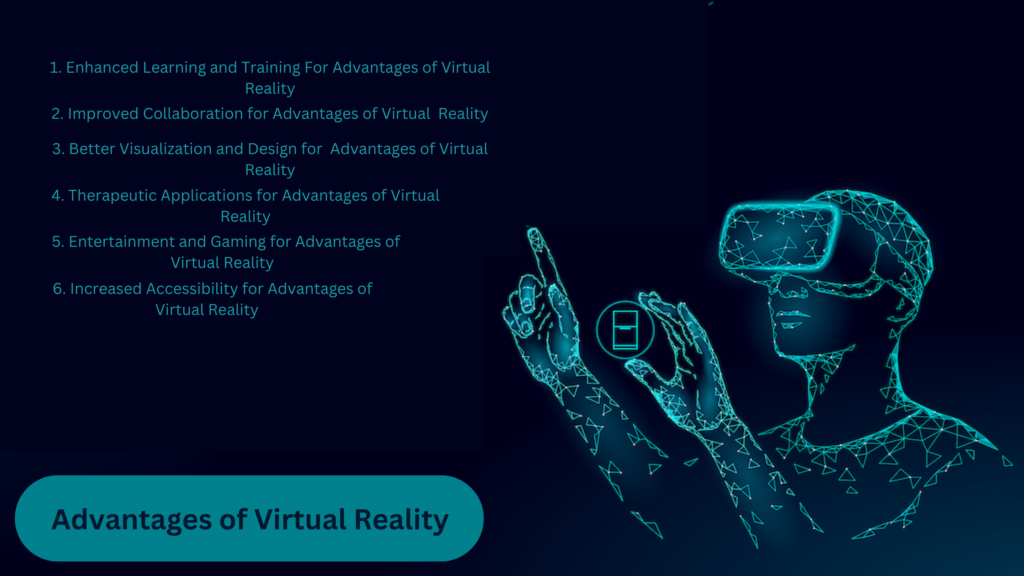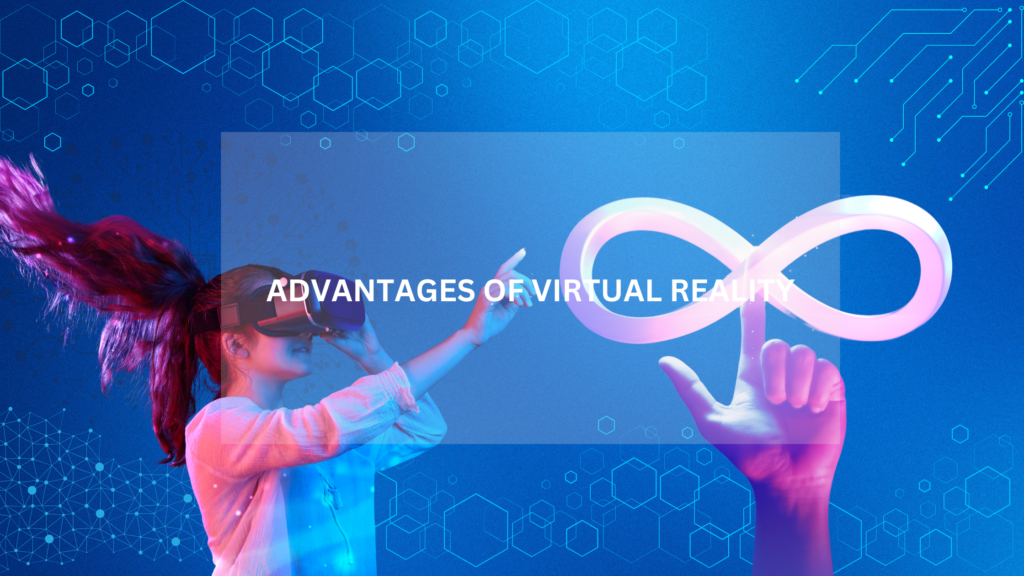1. Enhanced Learning and Training For Advantages of Virtual Reality
Virtual Reality (VR) offers immersive and interactive experiences that can significantly improve learning and training. By simulating real-world scenarios, VR allows users to practice skills and gain knowledge in a safe and controlled environment. This is particularly beneficial in fields such as medicine, aviation, and military training, where real-life practice can be risky or expensive.

2. Improved Collaboration for Advantages of Virtual Reality
VR enables remote collaboration in a way that traditional video conferencing cannot match. By creating a shared virtual space, team members can interact with each other and digital objects as if they were in the same room. This enhances communication, reduces misunderstandings, and fosters a more engaging and productive work environment.
3. Better Visualization and Design for Advantages of Virtual Reality
VR is a powerful tool for visualizing complex data and designs. Architects, engineers, and designers can use VR to create and explore detailed 3D models of buildings, products, and systems. This helps in identifying potential issues, making more informed decisions, and presenting ideas to clients and stakeholders in a compelling way.
4. Therapeutic Applications for Advantages of Virtual Reality
VR has proven to be effective in various therapeutic applications, such as treating phobias, PTSD, and chronic pain. By exposing patients to controlled virtual environments, therapists can help them confront and manage their fears and anxieties. Additionally, VR can be used for rehabilitation purposes, providing patients with engaging exercises to aid in their recovery.
5. Entertainment and Gaming for Advantages of Virtual Reality
The entertainment industry has been revolutionized by VR, offering users immersive experiences in gaming, movies, and virtual tours. VR games provide a level of interactivity and engagement that traditional games cannot match, while VR movies and tours offer new ways to experience stories and locations.
6. Increased Accessibility for Advantages of Virtual Reality
VR can make experiences and environments accessible to people who might not otherwise have the opportunity to enjoy them. This includes virtual travel experiences for those unable to physically travel, educational experiences for students in remote areas, and social interactions for individuals with disabilities.
7. Enhanced Creativity for Advantages of Virtual Reality
VR provides a unique platform for creative expression. Artists, musicians, and creators can use VR tools to produce innovative works that push the boundaries of traditional media. The immersive nature of VR allows for new forms of storytelling and artistic experiences that are not possible in the physical world.
8. Cost Savings For the Advantages of Virtual Reality
By reducing the need for physical prototypes, travel, and in-person training, VR can lead to significant cost savings for businesses and institutions. Virtual prototypes can be tested and modified without the expense of creating physical versions, and remote training can save on travel and accommodation costs.
9. Environmental Benefits For Advantages of Virtual Reality
VR can contribute to environmental sustainability by reducing the need for physical materials and travel. Virtual meetings, conferences, and events can minimize the carbon footprint associated with travel, while virtual prototyping and design can reduce waste and resource consumption.

10. Personalized Experiences for Advantages of Virtual Reality
VR allows for highly personalized experiences, tailored to the individual needs and preferences of users. Whether it’s personalized learning paths, customized gaming experiences, or individualized therapeutic sessions, VR can adapt to provide the most effective and enjoyable experience for each user.
Conclusion
Virtual Reality is transforming various aspects of our lives, from education and training to entertainment and therapy. Its ability to create immersive, interactive, and personalized experiences opens up new possibilities for innovation and improvement. As technology continues to advance, the potential applications and benefits of VR will only expand, making it an increasingly integral part of our future.
FAQs
1. What is Virtual Reality (VR)?
Virtual Reality (VR) is a technology that creates a simulated environment, allowing users to interact with it in a seemingly real or physical way using special equipment such as VR headsets and controllers.
2. How does VR enhance learning and training?
VR enhances learning and training by providing immersive, interactive environments where users can practice skills and gain knowledge in a safe, controlled setting, which is particularly useful in fields where real-life practice is risky or expensive.
3. Can VR improve collaboration in the workplace?
Yes, VR can improve collaboration by creating shared virtual spaces where team members can interact with each other and digital objects as if they were in the same room, enhancing communication and productivity.
4. What are some therapeutic applications of VR?
VR is used in therapy to treat phobias, PTSD, and chronic pain, by exposing patients to controlled virtual environments. It is also used for rehabilitation, providing engaging exercises to aid recovery.
5. How is VR used in entertainment and gaming?
VR revolutionizes entertainment and gaming by offering immersive experiences that traditional media cannot match, including interactive games, virtual tours, and immersive movies.
6. What are the cost savings associated with VR?
VR can lead to cost savings by reducing the need for physical prototypes, travel, and in-person training, allowing for virtual testing and remote learning that save on materials and expenses.
7. How does VR contribute to environmental sustainability?
VR contributes to environmental sustainability by reducing the need for travel and physical materials, thereby minimizing the carbon footprint and resource consumption associated with traditional methods.
8. Can VR provide personalized experiences?
Yes, VR can offer highly personalized experiences tailored to individual needs and preferences, enhancing effectiveness and enjoyment in areas such as learning, gaming, and therapy.
9. What industries benefit the most from VR?
Industries such as education, healthcare, architecture, engineering, entertainment, and remote work benefit significantly from VR due to its ability to provide immersive, interactive, and cost-effective solutions.
10. What are the future prospects of VR technology?
The future prospects of VR technology are vast, with continued advancements expected to expand its applications and benefits across various sectors, making it an increasingly integral part of our daily lives and professional practices.
